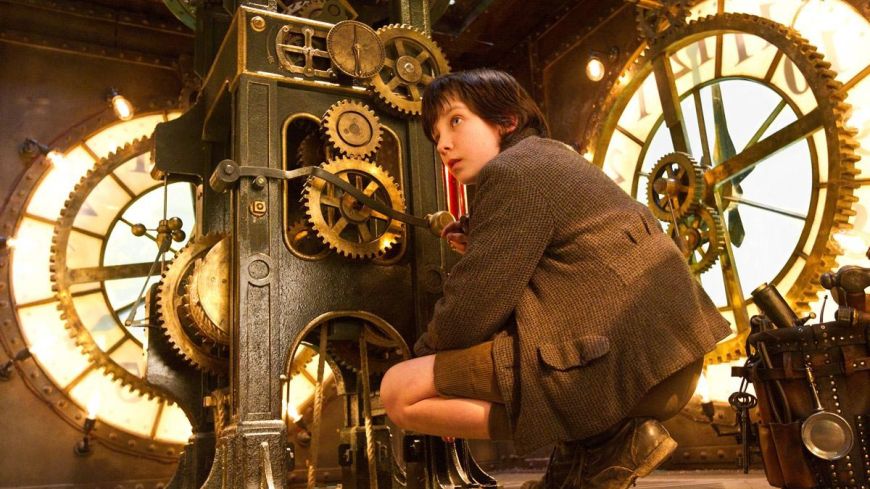
Family audiences weaned on the fast food junk of high speed garbage, talking animals, rollercoaster blurs of action and trivial dialogue are either in for a shock or a substantial nourishing treat with this wonderful oddball concoction from a bona fide master of his craft.
This a gloriously self-indulgent and at times surprisingly expressionistic piece of both madness and brilliance, a misty eyed love letter to the magic of movies and the early pioneers of cinema.
Unimpressed by recent 3D efforts and worried Scorsese was foolishly dabbling in a magical realist fairytale rather than bludgeoning Joe Pesci to death yet again I was eventually won over by the sheer artistry and weight of conviction on display.
Set principally in a Parisian railway station sometime in the 1930’s, the story concerns Hugo Cabret, a young orphaned lad hiding and living in the buildings rooftops, secretly maintaining the mechanisms running the station’s clocks. His loneliness survives by its wits, stealing food and clockwork parts from the local toy store run by a certain Monsieur Georges Melies (Ben Kingsley).
One day he’s caught in the act and forced to empty his pockets. Melies discovers Hugo’s notebook filled with drawings of a mechanical automaton that Hugo now possesses stirring resentful and painful memories for Melies (you find out why in the end, I’m not going to spoil it).
In flashbacks we discover how and why Hugo was separated from his much loved father and placed temporarily into the unwelcome care of his alcoholic uncle. And far below his hidden quarters and stiffly walking the beat due to a wartime injury is the bumbling child hating station inspector (Sacha Baron Cohen). He provides a kind of comic relief villain, always threatening to catch Hugo with his slavering Doberman and cart him off to an orphanage.
Cohen’s persona and performance is a mixture of Inspector Clousea and Chaplin and his zany yet restrained performance raises many laughs and some pathos along the way.
What then unfolds are two intertwined stories. First Hugo’s quest to complete the automaton robot in his attic, an act that will unravel family secrets, mysteries of the past and a lost world of artistic delights. And secondly, a thorough lecture on the early pioneers of cinema, their film making techniques and the value and meaning their works have brought to the world and without doubt to Scorsese himself.
This latter section is the strongest dramatically and on occasion provides some breathtaking moments although it takes time to win you over. There’s an element of ‘Ok Scorsese, we get it, movies are great, lets get back to the plot’ but it goes on for so long and is stated with such force and elegance you eventually have to just sit back and take in the wonder of it all. It also helps I suspect if you are a film buff with a decent knowledge of this era of cinema.
Many of the visual references and gags may be lost on younger audiences although they should still marvel at the way it’s crafted. In a way this is a kids film for adults in the know and I suspect the films disappointing returns (so far) are a reflection of that specialist knowledge.
The 3D is pretty damn good. It’s not up there with Avatar, but it's one of the best so far. I found my brain spent a good hour being aware I was watching a 3D film and then suddenly in the last part it seemed to just accept it. I was eventually in it rather than looking in from the outside at which point the 3D becomes immersive.
But the star of the film without doubt is the station itself and the recreated flashbacks to the early days of cinema. This is a film you could watch just once to take in the story and a second time just to luxuriate in the period detail and design. I’ll eat my hat if it doesn’t win an Oscar for some aspect of its art departments or visual effects.
It’s an occasionally difficult mix at times of the uncertain and the definite but the whole thing is so beautiful to behold that even though much of it’s slow paced you never get bored. There’s a stunning dream within a dream sequence that made me spontaneously applaud and several schmaltzy scenes that made this soft touch critic well up in the corner of the eye department.
It’s a multi-layered experience with many ideas and messages, almost too many to take in on one viewing but the whole damn thing is so gorgeous and has so many extraordinary moments that the oft over used word masterpiece is probably quite apt, even if it's just for parts of the whole.

